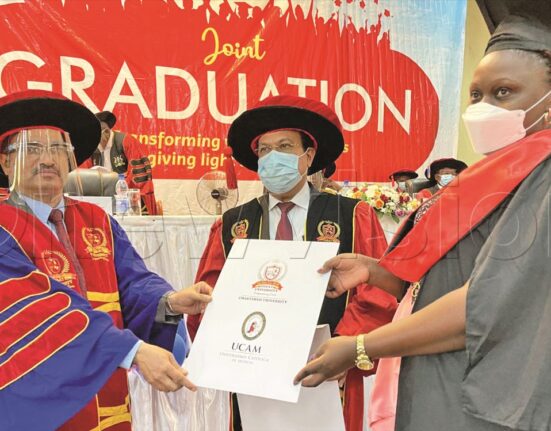By Dr Ambrose Kibuuka
It is now common knowledge that a university degree remains a vital achievement, but it does not guarantee a good life, let alone a job. The recent demonstrations by Makerere University fresh graduates on the streets of Kampala reminded us of this rude fact.
If you are a young person preparing to join university, this should serve as a wake-up call for you to avoid taking exactly the same path taken by the trapped lot that went through the same system before you.
You may not have the power and means to change the system, but you have all it takes to make personal choices and spend your life at campus in a way that will set you apart. You can make jobs look for you even before you complete your course. But you can also live like every other university student and, thereafter, complain like every other campuser. Only fools rush in where fools have been.
In one of my books, After University, What Next? There is a short chapter titled Fools Rush in Where Fools Have Been. I use the metaphor of the mouse trap. The only reason why it stays in business is because the trapped mice never have the chance to go back and tell others not to fall into the trap. So, like fools, they keep coming and falling into the trap.
If you are admitted for a three-year academic programme, it will take you approximately 1,095 days. This translates into 26,280 hours. Now, what you do with each of these hours daily determines who you will become as a person and what you will become in society.
The secret to bright career prospects lies in making every moment at campus constructively count. But this starts with the understanding that universities in Uganda and most other parts of the world will never give you everything you need to excel. Look for all it takes.
The purpose of a university is not simply to furnish you with academic qualifications, which you will in turn use to acquire a job in your field of specialisation. The true value of university education is to groom you into a responsible adult who combines professional competence with a diversity of capabilities and values that make you fully human and functionally productive in society.
In other words, the campus moment is a crucial time for growing in, growing up, and growing out. Unfortunately, universities (generally) are organised as academic factories of examination passers, leaving out these critical elements. So, to avoid the future shock, you need to use your campus time to resolve in advance the question: After university, what next? Below I share with you seven principles which I have distilled over the last 22 years of my engagement in the field of career guidance. It is your personal life so you have to take personal steps despite the faults in the system.
Learn How to Learn
Cognitive neuroscience tells us that the more data you feed into the human brain, the more active it becomes. In fact, the more the diversity of data, the greater the creative power.
For the brain, there is almost no useless knowledge. People who are more exposed tend to find it easier to generate innovative solutions. While at campus, don’t limit yourself to only your official course of study. The 21st century is an inter-disciplinary and multi-disciplinary world.
Invest your time profitably by taking advantage of the library and the Internet to learn as many things as you can. The fact is, if you have developed the learning discipline, there is more to learn online than from the lecturer’s notes. Attend seminars, public lectures, workshops, conferences, etc. Develop a culture for learning. I have personally experienced that the more I learn, the more I yearn to learn more and what I have learned translates into my earnings.
Pursue Self-Mastery
The old Latin wisdom goes, Qui se vincit bis vincit (He who conquers oneself conquers twice). The starting point for taking full charge of your life is understanding your personal identity and peculiar circumstances. This helps you not to be influenced by crowds and to be swept by the whirl wind of band wagon effect. Continuously create private time to pursue answers to such fundamental questions as Who Am I? (this is mainly about your personality, character, aspirations, personal values, personal belief system, preferences); What Am I? (This is basically about your status in community, your external accomplishments); Where am I coming from? (this is about understanding your family background, your personal history, your current situation, what is possible and impossible for you under the circumstances). Self-mastery helps you to know how to behave prudently and act in your best interest in any given situation.

Unveil the Purpose of Your Life
A combination of learning to learn and the pursuit of self-mastery will put you in a better position to develop a suitable career vision and mission. This is basically a derivative of what you have discovered as a combination of your strong natural abilities, your technical capabilities, your passion, identified gaps in society, as well as existing and future opportunities as far as you can foresee the trends. All this should help you answer the question, where do I fit in all of this? The more informed you are, the sharper your answer to this question and therefore, your career vision.
Remember the Future
It is one thing to define all the above, and it’s another to take action on them. One of the things you will need to do soon after the fresher’s excitement is over, is to develop a clear personal development plan. This is the plan that will guide you to implement the seven tips I’m sharing with you here. Of course the plan will be alive and it will keep changing with the expansion of your exposure. It is important that you identify someone who you can share this plan with, to keep you accountable. Once well done, by the end of your course, this plan will have automatically given you great strategic career positioning.
Become a Value Agent
Management scholar Charles Handy told his children on their graduation day: “Look for customers, not for jobs”.
While at university, always look around and ask: “What value can I add to the people around me?” Find a way to use your knowledge, skills and passion to add value to other people, especially through volunteering. Among your peers, the staff, your village, your worship community…be known for providing a solution. For example, be the one that picks plastics littered on campus. Do it diligently. With this approach, it is possible to graduate with your CV bearing three years of personal initiative as working experience in its own right.
So, when you go out there, look for customers for what you can do for them, don’t just look for jobs. You can graduate with a three-year working experience. This postures you as someone who is needed not just one who is given a favour. Use the time at campus to develop and define your value addition quotient.
Develop Habits of Highly Effective Youth
Do homework around campus during the first semester. Find out who the highly effective youth are: Those who make constructive things happen around campus. Find out the common attributes that define them. Learn from them. Some of the things I have observed about such young people are: They are informed, mind their business, tend to employ information and communications technology tools (Apps) to scale and popularise their work, tend to have a supportive network of fellow youth and older mentors or role models around them, tend to be well exposed and disciplined go-getters. Do your homework and adopt some of the habits that add value to you.
Apart from the right to basic life, the world owes you nothing. Even opportunities are worked for. Life does not take excuses. To the least, it simply ignores them. At worst, life harshly punishes excuses. Life only rewards those who make things happen and have results to show.
Life does not mind what you go through to achieve the results; it only recognises the results, not the process or what your starting point was. Elsewhere, I have written that “Markets don’t pay for effort; they pay for results”. In the food market, there are no stalls for farmers whose acres of food were destroyed by drought, floods or pests.
There are only stalls for farmers who had a good harvest. No consumer is interested in your sad story; all they want is food. So, they will only look for stalls where there is food and pay for that.
Similarly, when you graduate, you must have food on your stall in order for you to earn. No employer will be interested in excuses, such as we had bad lecturers. The solution is all hidden in how you spend your time at campus.
Explore the Sea of Career Options
The 21st Century is uniquely rich with opportunities that no graduate should go jobless. Unfortunately, most young people have not been prepared to recognise these opportunities and tap them. The key thing to note here is that you are not what you study. What you study in school should not define you; it should just inform you. So, if you studied fine art, you can apply that art in making the best designer cakes in town. You will be overwhelmed by high-end customers. Learn to blend knowledge and skills in order to tap opportunities. Use the time at campus to find and learn knowledge and skills that strategically complement your official course. Look to the Internet, friends, vocational institutions and government programmes, among others.
The writer is an education and careers consultant.









Leave feedback about this